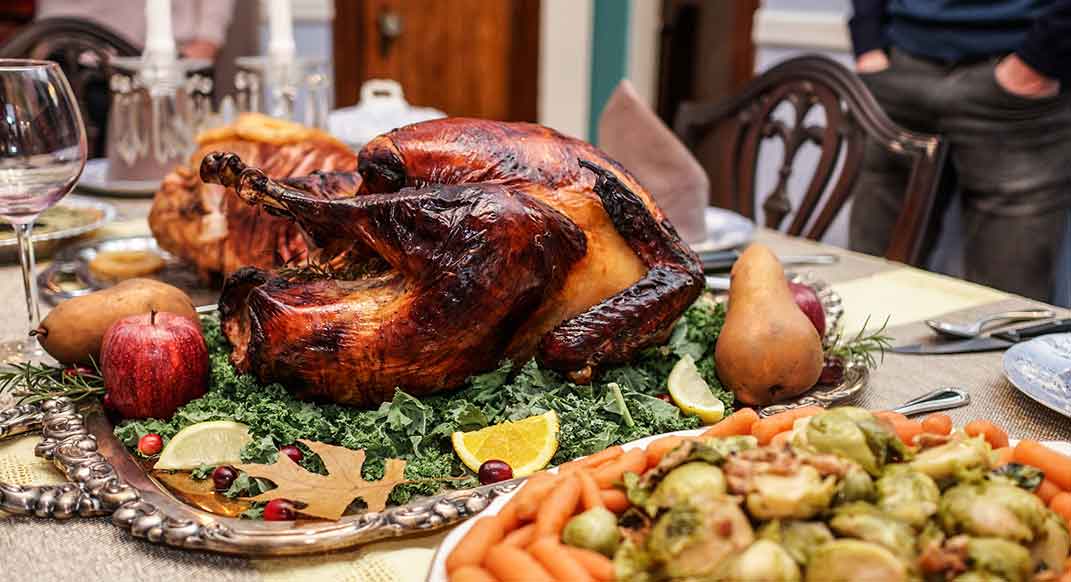Four Winter Foods to Boost Running Performance

There are so many things to love about the holidays: family time, snowy running and the best food of the entire year. But for some, the six weeks of indulgence between Thanksgiving and New Years can cause apprehension. You may have goal races on your mind. Or, maybe you’ve resolved to start the New Year with a renewed emphasis on nutrition and healthy fueling.
If you do it right, you can come out of the holidays stronger than you went in. Put these four holiday classics onto your plate to make sure 2018 is a fast and healthy year.
Pumpkin and winter squash
As if we needed any justification for that extra slice of pie. Pumpkins and squash, like other orange veggies, contain beta carotene, an essential catalyst for Vitamin A production.
Both beta carotene and Vitamin A play important physiological roles. Beta carotene helps your body fight the free radicals—unstable, particularly reactive atoms that can damage DNA and cells. Your body produces more free radicals when you exercise hard, because they emerge when you put your body through oxidative stress. But certain antioxidants, like beta carotene, stabilize free radicals, helping to protect you from things like the flu and even certain cancers.
Beta carotene also helps your body produce Vitamin A, which helps maintain skin, teeth and soft tissue. Vitamin A is one of the few vitamins the body can synthesize on its own. So, whole-food sources of its components—including beta carotene—are more physiologically effective than pure Vitamin-A supplements.
Eat it: Peel and slice pumpkin or any yellow squash and roast with olive oil and your favorite spices. Mash into a spread for sandwiches or add pieces to a grain salad with wheat berries, balsamic vinegar and toasted walnuts.
Cranberries
These tangy little berries may be relegated to a minor role on your Thanksgiving table, but they pack a powerful phytochemical punch. Tiny nutrients called anthocynanins and flavonols usually develop as the berries ripen (concentration depends on the amount of light and heat they’re exposed to).
Collectively called phytochemicals, this category of nutrients helps fight muscle inflammation. Additionally, research published by the National Center for Biotechnology Information has shown that they “exhibit strong physiological activities against infections, cancers, allergies and viruses.” All that means cranberries may help you ward off that winter cold or flu .
The Journal of Agricultural and Food Chemistry evaluated the total amount of phytochemicals in cranberry products and found that fresh berries topped the list, followed by 100-percent juice and dried berries. You don’t have to eat or drink your cranberries right after your run, but getting them in whatever form you like best will provide an extra immune boost.
Related: Three DIY Energy-Food Recipes for Runners
Eat it: Sprinkle dried berries on a salad, bake them into oatmeal cookies in place of raisins or add fresh berries to your favorite muffin recipe. For the easiest cranberry sauce, combine a bag of frozen berries with one cup each water and sugar and cook until the berries burst.
Turkey
Turkey is one of the leanest of all meats. It provides all the protein benefits with far fewer saturated fats than typical red meat. It is also an excellent source of two underrated nutrients: niacin and zinc.
Zinc, which is also in dairy, legumes and whole grains, is essential for immune-system function. It helps build cells, heal abrasions and promote blood clotting when you get a cut.
Niacin, which is a B vitamin, helps facilitate efficient metabolism of everything from carbohydrates to fat. Additionally, a study in the Journal of the International Society of Sports Nutrition showed that B-vitamin deficiencies “may impair both aerobic and anaerobic exercise performance, but supplementation has not been shown to enhance performance in well-nourished individuals.”
Eat it: Cook your Thanksgiving leftovers into a warming soup with chicken broth, veggies and wild rice. Use ground turkey in place of beef in tacos, sloppy joes or burgers.
Pears
They might be the easiest way to boost your energy this winter. They’re a great source of quercetin, a little-studied micronutrient that may help increase physical endurance. In a study by the EAS Academy, quercetin had a “a caffeine-like psychostimulant effect, which may enhance mental and physical performance.”
Another helpful nutrient in pears is epicatechin. Also found in cocoa powder, epicatechin is a member of the flavonol family. It helps boost vascular performance and regulate the constriction and relaxation of arteries. These benefits may also extend to brain blood flow and cognitive function.
Eat it: Don’t peel pears, as the skin is where all the good stuff is. Halve them lengthwise, cut out the core and sprinkle with brown sugar before roasting for an easy dessert. Or, slice them and use them in place of pineapple in an upside down cake. Fresh pears are at their peak in midwinter. Enjoy them out-of-hand while you can.